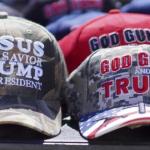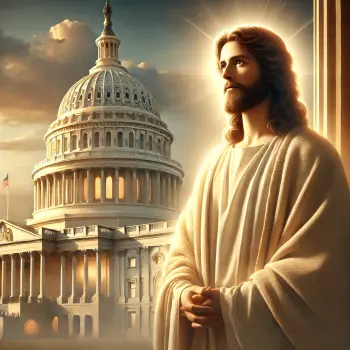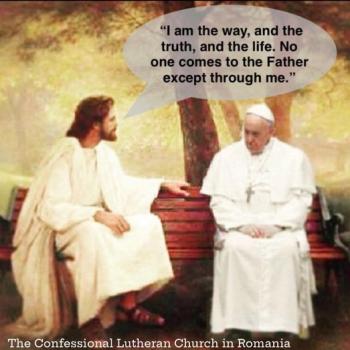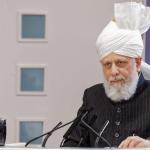Anti-Anti-Christian Nationalism, Part 1
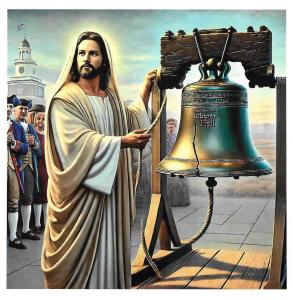
“I will defend religious liberty in all of its forms … I will protect Christians … I will also protect other religions … we will bring our country back together: one nation under God,” said presidential candidate Donald J. Trump when announcing a new coaltition, Believers for Trump, at a Turning Point Action gathering on July 26, 2024. Is this an example of American Christian Nationalism (ANC)? Not if “religious liberty” is defended. Religious liberty is the position defended by Anti-Christian Nationalism.
I have been bumfuzzled at the alleged battle between Christian Nationalism and Anti-Christian Nationalism. I have been trying without much success to clarify positions within the kerfuffle. My friends are annoyed at me for seemingly making matters more bedeviled. So let me test to see if introducing the term, Anti-Anti-Christian Nationalism, will help to clarify.
An initial clarification: anti-anti-Christian nationalism is not an endorsement of Christian nationalism. Whew! Got that straight.
Making an effort to get clear on American Christian Nationalism is worth it, I think. Why? Because healthy energies are wastefully siphoned off into anti-evangelicalism, energies that should be directed toward anti-MAGAism. Please, aim your invectives at the right target! Shoot arrows at the religious cult of Trumpism, not at our evangelical friends and neighbors.
Christian Nationalism, Anti-Christian Nationalism, & Anti-Anti-Christian Nationalism
What do Christian nationalists believe?
As I’ve said frequently, I’ve never knowingly met an American Christian nationalist. This is due either to the fact that my home turf is progressive Berkeley or due to the fact that so few Christian nationalists exist that I have failed to connect with them on my travels. Regardless, I feel responsible to understand what ACNers think and feel.
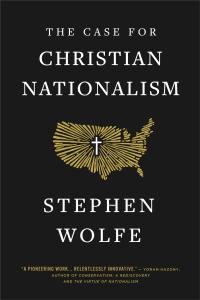
What does a Christian nationalist think? Here is the central thought: there is a close tie between the American way of life and Protestant Christian principles. At least according to Stephen Wolfe in his The Case for Christian Nationalism.
“It is evident enough that for most of United States history Americans thought of themselves as a Christian people,” writes Wolfe (Wolfe, 2023, p. 389). Even though the 1st Amendment to the U.S. Constitution proscribes a federal establishment of religion, the states retain this option. And there is good precedent. “Despite the fact that the Constitution lacks Christian language, we cannot forget that the American people in the founding era and early American republic were Protestant Christians, animated by religious concerns, who viewed themselves as a Christian people and relied on Protestant principles and biblical argumentation” (Wolfe, 2023, p. 429).
Christian nationalist senator from Missouri, Josh Hawley, is happy with the phrase, “America as a Christian nation.” Many of us have forgotten America’s Christian roots, yet the biblical influence remains. “Even in our most bitter conflicts, Christian culture has been America’s common ground.”
Do Christian nationalists call themselves Christian nationalists?
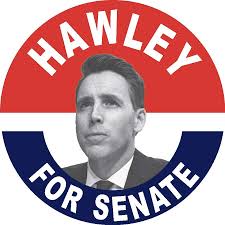 Would an ACNer own the name, Christian Nationalism? Sorta. Let’s ask Wolfe disciple, David Wilson.
Would an ACNer own the name, Christian Nationalism? Sorta. Let’s ask Wolfe disciple, David Wilson.
…basically, I thought “Christian nationalism” was a big improvement over “white supremacist”—the “Theofascist, Christofascist, white supremacist.” Basically, “Christian nationalism” is something I can work with. I’m a citizen of this nation, and I’m a Christian. Okay, I can work with that….I would prefer “Christian republicanism.”
Stephen Wolfe and David Wilson are rare birds. Especially if the ACN flock is as large as it’s said to be.
Do Reconstructionism and Dominionism fly in the Christian Nationalism flock?
Also flying in the American Christian Nationalism flock are Reconstructionism and Dominionism. Reconstructionists are disciples of Rousas John Rushdoony (1916-2001), for whom…
“…Reconstruction was a paradigm that sought to bring every aspect of life under Christ’s Lordship, built on a theonomic ethic which subsumed reality under the law-word of Christ in scripture.”
Christian Dominion Theology underlies Reconstructionism with an exegesis of Genesis 1:26-29, where God grants dominion to the human race. C. Peter Wagner of the Wagner Leadership Institute is convinced that “It is our task to become spiritual and social activists until Satan’s dominion is ended” (Wagner, 2007, 47). According to Got Questions…
Kingdom Now, Dominionism, or Christian Dominionism are terms referring “to a subset of American Christianity that is conservative, politically active, and believes that Christians should, and eventually will, take control of the government.”
Evidently, this is what a Christian Nationalist thinks.
What do Christian nationalists feel?
Now let’s ask: what do ACNers feel? Answer: anxiety. Perhaps ACNer Douglas Wilson‘s anxiety is attuned to a more general anxiety.
“…now with 60 million children dead, with homosexual marriage imposed on the states, with the trans madness going on, drag shows for kids, riots—basically approved riots and disapproved riots—the whole thing makes me say, Okay, where’s your vaunted secularism now?” Neutrality does not work. It’s manifestly a sham. There is no neutrality. And so consequently, I want to argue that we need to govern ourselves with reference to the transcendental reality that is God in Christ.”
This suggests ACNers feel what so many of us in America are feeling right now, namely, cultural loss. The traditionalists among us are terrified at the loss of cultural support for family values, the rule of law, and trustworthy institutions. The progressives among us are terrified at losing social gains in gender equality, racial equality, and the integration of LGBTQ+ persons. These two strains of loss converge in the widespread phenomenon our French friends call, ressentiment. Anxiety combined with anger in ressentiment flares like a blow torch into burning adversarial rhetoric.
Ressentiment within ACN
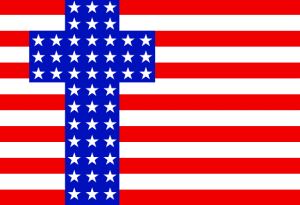
Might the doctrines of American Christian Nationalism provide one microphone for traditionalists to give voice to their ressentiment?
If so, then we should listen directly to the ACNers themselves. But what phone numbers do we dial? What websites do we visit? Almost nothing is there. Why are ACNers themselves virtually invisible? Because they’re in hiding, allegedly. [click here for other genuine ACNers I could dig up]. American Christian Nationalism belongs to the deep church, just as Donald Trump’s enemies belong to the deep state. Didja get that?
How then can we learn just what ACNers believe? By asking the Anti-Christian Nationalists. That’s how. So, we’ll ask the Anti-Christian Nationalists to tell us what they believe in the next post.
Pre-Conclusion
Here is the thesis I’m developing in this multi-part series on Anti-Anti-Christian Nationalism.
Several Ex-Evangelicals along with Progressive Protestants are displacing their anger at Donald Trump’s MAGA party onto evangelicals by painting evangelicals with the colors of Christian nationalism. That is, anti-Christian nationalists blame white evangelicals for Christian nationalism. This is a waste of healthy political energy that should be directed against MAGA Republicans.
Please click on Anti-Anti-Christian Nationalism Part 2 to see a summary of what Anti-Christian nationalists believe.
PT 3247 Anti-Anti-Christian Nationalism, Part 1
Christian Nationalism Resources
Project 2025 on Christian Nationalism
Anti-Anti-Christian Nationalism, Part 1
Anti-Anti-Christian Nationalism, Part 2
Anti-Anti-Christian Nationalism, Part 3
Is “Our Confession of Evangelical Conviction” the New Barmen?
▓
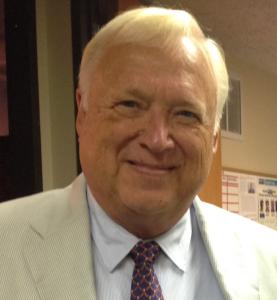
For Patheos, Ted Peters posts articles and notices in the field of Public Theology. He is a Lutheran pastor and emeritus professor at the Graduate Theological Union. His single volume systematic theology, God—The World’s Future, is now in the 3rd edition. He has also authored God as Trinity plus Sin: Radical Evil in Soul and Society as well as Sin Boldly: Justifying Faith for Fragile and Broken Souls. He recently published. The Voice of Public Theology, with ATF Press. See his website: TedsTimelyTake.com and Patheos blog site on Public Theology.
▓
References
Alberta, T., 2023. The Kingdom, the Power, and the Glory: American Evangelicals in an Age of Extremism. New York: Harper.
Butler, A., 2021. White Evangelical Racism. Chapel Hill NC: The University of North Carolina Press.
Cooper-White, P., 2021. The Psychology of Christian Nationalism: Why People Are Drawn In and How to Talk Across the Divide. Minneapolis MN: Fortress Press.
Decker, A., 2022. Red State Christians: A Journey into White Christian Nationalism and the Wreckage it leaves behind.. New York: Broadleaf.
DuMez, K. K., 2020. Jesus and John Wayne: How White Evangelicals Corrupted a Faith and Fractured a Nation. New York: Norton.
Gorski, P. & Perry, S., 2022. The Flag and the Cross: Christian Nationalism and the Threat to American Democracy. Oxford: Oxford University Press.
Hendrickson, O., 2023. Christians Against Christianity: How Right Wing Evangelicals are Destroying our Nation and our Faith. Boston: Beacon.
Heritage Foundation, 2023. Project 2025: Mandate for Leadership, Washington DC: Heritage Foundation.
Ingersoll, J., 2015. Building God’s Kingdom. Oxford: Oxford Academic; https://academic.oup.com/book/10399.
Miller, P. D., 2022. The Religion of American Greatness: What’s Wrong with Christian Nationalism?. s.l.:Christian Audio.
Peters, T., 2023. The Voice of Public Theology. Adelaide: ATF.
Wagner, C.P., 2007. “Dominion! Kingdom Action Can Change the World,” Journal of the American Society for Church Growth 18:1; 37-48.
Whitehead, A. & Perry, S., 2022. Taking Back America for God: Christian Nationalism in the United States. 2nd ed. Oxford: Oxford University Press.
Wolfe, S., 2023. The Case for Christian Nationalism. Moscow ID: Canon Press.




